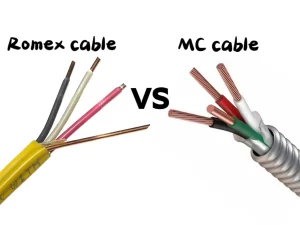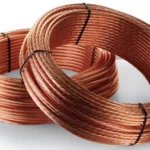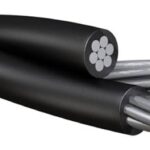When you're choosing electrical cable for a modern wiring project, you'll typically be looking at two main types: Non-Metallic Sheathed Cable (Romex) and Metal-Clad Cable (MC cable). These are the modern-day alternatives to old BX cable, and each is suited for a different job.

romex wire vs mc cable
Romex Cable: The Go-To for Residential Wiring
Romex is the most common type of residential wiring. It consists of a few insulated wires and a bare ground wire, all bundled inside a durable plastic or PVC sheath.
- Pros: It is inexpensive, lightweight, and easy to install. It's the perfect choice for dry indoor environments where wiring is hidden inside walls, ceilings, and floors.
- Cons: It lacks physical protection. If Romex cable is exposed, it's vulnerable to damage from nails, rodents, or other mechanical forces.
MC Cable: A Tougher, Modern Armored Cable
MC cable is the modern version of BX. It also has a flexible metal sheath, but it includes a dedicated ground wire, making it compliant with modern safety codes.
- Pros: It is durable and provides excellent physical protection for the wires, making it a great choice for exposed wiring, commercial buildings, or industrial settings. Its sheath is often made of aluminum, making it lighter and easier to cut than steel.
- Cons: It is more expensive than Romex, and its installation requires specialized cutting tools and connectors.
How to Choose
- For most new residential wiring projects where the cable will be hidden inside walls, Romex is the most cost-effective and easy-to-install choice.
- If the cable needs to be exposed, or is in an environment where it could be physically damaged (like a basement, garage, or commercial space), MC cable is the safer and more reliable option.
No matter which cable you choose, always follow your local electrical codes and use the correct wire gauge for your electrical load.





